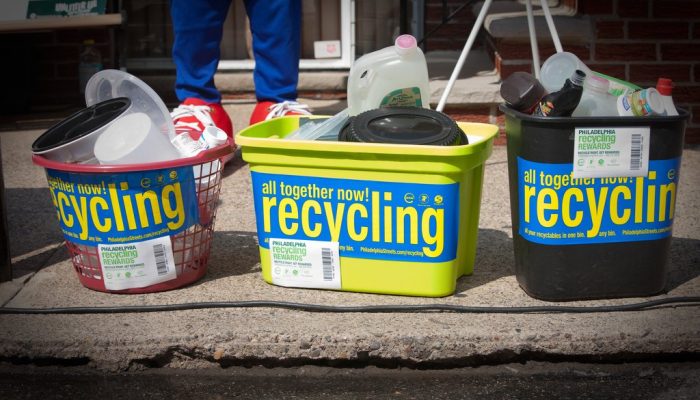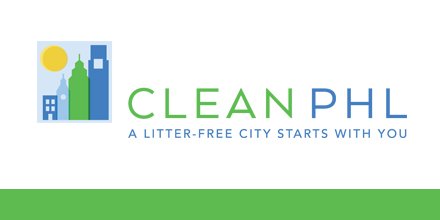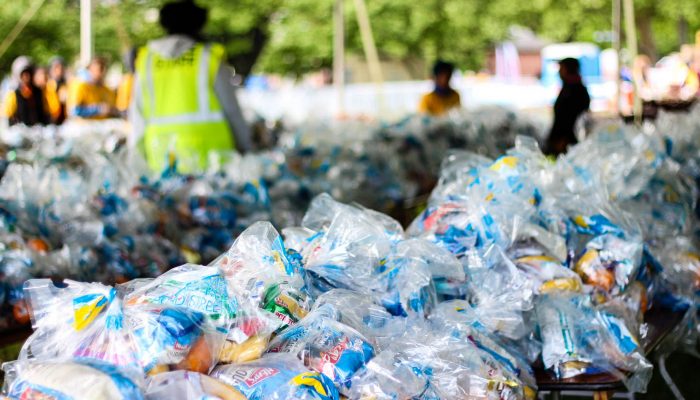Each year Philadelphia disposes of nearly 1.5 million tons of residential and commercial waste. And sending waste to landfills creates emissions that contribute to climate change. Not to mention, litter takes away from the beauty of Philadelphia’s neighborhoods. Sadly, much of what is thrown away as trash can be recovered and put to better use through reuse, donation, recycling, and composting.
That’s why the City set a goal of Zero Waste by 2035. To reach this goal, a cabinet was formed to work on the issues surrounding waste and litter in our City. The first result? A new plan to strategize how we can achieve this. The Zero Waste and Litter Plan describes a set of actions to help Philadelphia reach Zero Waste in just 18 years.

What does Zero Waste mean?
Zero Waste may sound self-explanatory, but it’s not that simple. Philadelphia’s long-term “Zero Waste” goal is get rid of the use of landfills and conventional incinerators by 2035. To do this, Philadelphia will reduce waste creation and increase waste diversion 90 percent by 2035, with the remaining 10 percent utilized as waste to energy.
How are we going to get there?
- The Building Waste Audit Program is a guide for city-owned and commercial buildings to better understand their waste generation. This program will check that all city-owned buildings have a recycling plan and use it to report recycling activity. It will also include the Recycling Ambassador Program, where selected staff members oversee recycling and educate fellow staff. The Ambassadors will use the Building Waste Audit Guide to reduce and divert other materials – in addition to those mandated by law to be recycled or specially disposed of – like food scraps and plastic bags.
- The Zero Waste Events Program solidifies Zero Waste goals, plans, and resources for all public events requiring a permit in Philadelphia. It sets the standard for events, and gives vendors access to compost pickups and recycling. A Zero Waste Events Guide for organizers will inform them about opportunities for diverting waste from their events through various recycling, composting, and catering options.
- The Zero Waste Partnership Program will encourage Philadelphia residents, community groups, non-profit organizations, municipal government, businesses, and institutions to reduce waste, increase recycling and composting, and adopt waste diversion practices — and recognize them for their efforts. Through revamping the Recycling Rewards program and creating incentives for small businesses, Zero Waste Partners will see more benefits from recycling.
- Zero Waste Pathways – Over the next decade, Philadelphia will be exploring citywide organic material collection as well as increased access to non-single stream recycling for residents and commercial entities. The Streets Department is currently conducting an “Organics Feasibility Study” to find out what’s needed for city-wide compost collection. We plan to utilize our new waste diversion tracking system to identify where there are gaps in what we can currently recycle. Looking at the data, we hope to spur investment in areas where recycling diversion systems are needed to fill those gaps.
We’ve highlighted just a few of the strategies set out in the plan. There are many more actions around issues of litter enforcement, behavior change, data, and engagement. To get the bigger picture, read the Zero Waste plan in its entirety.

Reaching the Zero Waste goals will move Philadelphia toward achieving the Greenworks vision of becoming a sustainable city for all. If you’re interested in helping us achieve this work, follow our Greenworks on the Ground guides. For all the ways we can make Philly cleaner, together, visit CleanPHL.org.

